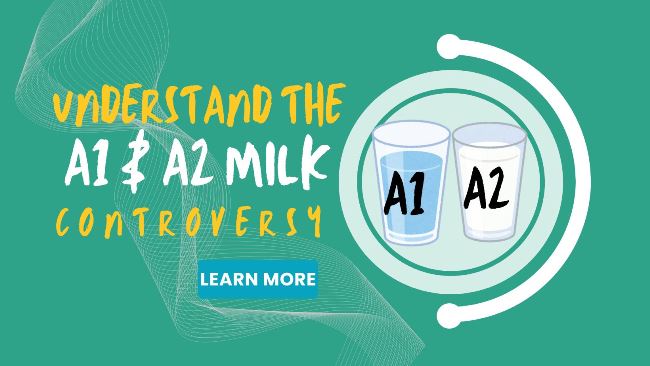A1 vs. A2 Milk: Understanding the Debate and Health Impacts
What Are A1 and A2 Milk? Claims and Arguments Surrounding A1 and A2 Milk

Cow’s milk has been a dietary cornerstone across the globe, lauded for its nutritional value and versatility. However, recent years have witnessed growing debate over the differences between A1 milk and A2 milk and their potential health implications. The controversy centers on the beta-casein protein variants in these milks and their respective effects on human health.
In India, this debate has roots in historical shifts in dairy practices and consumer trends, while globally; it has influenced marketing, consumer choices, and regulatory oversight. This article aims to provide a comprehensive understanding of the A1 and A2 milk controversy, blending scientific findings, consumer concerns, and industry perspectives.
What Are A1 and A2 Milk?
Definition and Key Differences
Let’s begin by understanding the fundamental differences between A1 and A2 milk. A1 and A2 milk refer to the two primary types of cow’s milk, distinguished by the kind of beta-casein protein they contain. Beta-casein is one of the major proteins in milk and can be classified as either A1 or A2 based on its molecular structure. The difference lies in a single amino acid variation: A1 milk contains histidine at a specific position in the protein chain, while A2 milk contains proline.
Basic Differences
Both types contain beta-casein protein, but they differ in their specific variants. A1 milk contains A1 beta-casein, whereas A2 milk contains A2 beta-casein. The distinction lies in an amino acid at position 67 of the protein chain: A1 beta-casein has histidine, while A2 beta-casein has proline.

According to some research studies, during digestion, A1 beta-casein can produce a peptide called beta-casomorphin-7 (BCM-7). BCM-7 is believed to have potential negative effects on human health, such as digestive discomfort or inflammation. A2 beta-casein, on the other hand, does not produce BCM-7, making A2 milk a preferable choice for certain individuals, particularly those sensitive to regular milk.
Origins and Genetic Factors
Historically, cows predominantly produced A2 milk. However, a genetic mutation thousands of years ago introduced the A1 variant, which is now prevalent in many dairy breeds. Breeds like Holstein and Friesian cows are associated with A1 milk, while Jersey, Guernsey, and some indigenous breeds are more likely to produce A2 milk. This genetic divergence has led to the coexistence of both A1 and A2 milk in today’s dairy supply chain.
Historical and Genetic Context
In India, the A2 milk controversy has its roots in the milk revolution between the 1960s and 1980s. During this period, high-yielding cattle breeds like Jersey Milk, Holstein Milk, and Ayrshire Milk were introduced to boost milk production. This shift led to reduced reliance on indigenous breeds like Gir and Sahiwal, many of which naturally produce A2 milk. It is important to note that only cattle with the A2A2 genotype produce A2 milk. Otherwise, the milk is classified as A1. Over the last decade, increasing awareness about the potential health benefits of A2 milk has spurred demand, with A2 dairy products being sold at premium prices. Marketing claims have further driven consumer interest, positioning A2 milk as a healthier alternative.
Don’t miss out consumer-based stories like this, read:
- Bamboo Milk: A Sustainable Dairy Alternative to Feed the World
- How Air Pollution is Harmful to Kids? How to reduce Risk?
- How to Choose Your First Electric Bike?
- Everything You Wanted to Know the City of Dhaka, Bangladesh
- Are You Using Healthy Toothpaste? Learn About the Harmful Ingredients It Might Contain
Claims and Arguments Surrounding A1 and A2 Milk
Health Implications of A1 Milk
Proponents of A2 milk argue that A1 milk may have adverse health effects, particularly related to digestion and inflammation. When A1 beta-casein is broken down during digestion, it releases a peptide called beta-casomorphin-7 (BCM-7), which some studies suggest may trigger discomfort, inflammation, or even more serious conditions like heart disease and type 1 diabetes.
However, critics point out that evidence linking BCM-7 to these health issues remains inconclusive, with many studies conducted on animals or in highly controlled settings that may not reflect real-world conditions.
Health Benefits of A2 Milk
Advocates for A2 milk claim it is gentler on the digestive system and less likely to cause symptoms like bloating, gas, or discomfort, making it a preferred option for individuals who experience sensitivity to conventional milk. This has positioned A2 milk as an appealing choice for people who suspect they are lactose intolerant but may actually be sensitive to A1 proteins.
While some research supports the notion that A2 milk may be easier to digest for certain individuals, particularly those with mild dairy sensitivities, critics emphasize that these benefits are not universal and require further validation through larger, independent studies.
Scientific Debates
The controversy is fueled by conflicting scientific findings. Some studies suggest a clear difference in how A1 and A2 proteins affect the body, while others find no significant distinction in their impact. This divergence in results highlights the need for more rigorous, large-scale research to settle the debate and guide consumers effectively.
Current Scientific Consensus
Review of Key Studies
While initial studies suggest potential differences in digestibility and health impacts between A1 and A2 milk, many findings are limited by small sample sizes or methodological constraints. Comprehensive, large-scale trials are needed to confirm these results and provide definitive guidance.
Statements from Health Authorities
Health organizations remain cautious in endorsing A2 milk over conventional milk, emphasizing the lack of conclusive evidence to support broad health claims. Most advise consumers to base their choice on personal tolerance and preferences rather than marketing claims alone.
Claims and Challenges
Health Implications of A1 and A2 Milk
Some research links A1 beta-casein to adverse health effects, including digestive discomfort, inflammation, and possible links to conditions like heart disease and type 1 diabetes. The release of BCM-7 during digestion is central to these claims. Conversely, A2 milk is marketed as easier to digest and less likely to cause these issues, especially for those with dairy sensitivities.
However, critics highlight the lack of robust evidence to confirm these claims. While some studies support the notion that A2 milk is better tolerated, others find minimal or no differences between A1 and A2 milk in their effects on health.
Consumer Confusion
Marketing strategies have played a significant role in shaping perceptions about A2 milk. Consumers often pay a premium for A2 products, such as A2 ghee, under the assumption that they are healthier. However, it’s important to note that ghee, regardless of its source, is a fat product that does not contain the proteins in question. Thus, claims about the superiority of A2 ghee over regular ghee lack scientific basis.
The Role of Regulation
The debate has also caught the attention of regulatory bodies. On August 21, 2024, the Food Safety and Standards Authority of India (FSSAI) issued an advisory to curtail misleading claims about A1 and A2 milk on dairy product labels. This move was aimed at protecting consumers from potentially deceptive marketing tactics.
However, the advisory was retracted just days later, on August 26, 2024, after a letter by Mr. Venugopal Bhadarvada, a member of the Indian Council for Agricultural Research (ICAR), urged Prime Minister Narendra Modi to allow more thorough examination by experts. This retraction acknowledged the complexity of the issue and the need for balanced stakeholder consultation.
Implications for the Dairy Industry
Impact on Farming Practices
The A1 and A2 controversy has led some farmers to selectively breed cattle that exclusively produce A2 milk. While this transition can be profitable, it also poses challenges in terms of time, cost, and herd management.
Global Trends in Dairy Consumption
The debate has influenced broader shifts in dairy consumption, with consumers increasingly seeking alternatives perceived as healthier or more sustainable. This trend benefits not only A2 milk producers but also the burgeoning plant-based milk industry.
Consumer Considerations
Making Informed Choices
Consumers should approach A2 dairy products with a critical perspective. While there is evidence that A2 milk may be better tolerated by some individuals, the overall health claims remain inconclusive. Paying a premium for products like A2 ghee, which do not contain proteins at all, may not provide any additional health benefits.
Role of Regulation the FSSAI
The FSSAI’s involvement underscores the importance of regulating claims to ensure that consumer choices are guided by facts rather than marketing hype. The withdrawal of the advisory reflects the ongoing debate and the need for further scientific clarity to resolve the controversy
Conclusion
The A1 and A2 milk controversy intertwines science, consumer perception, and regulatory oversight. While A2 milk has gained popularity for its potential health benefits, the scientific community continues to call for more comprehensive studies to validate these claims. At the same time, regulatory bodies like the FSSAI must strike a balance between protecting consumers and supporting a fair marketplace.
For consumers, the key lies in making informed decisions based on credible evidence and personal dietary needs. As the debate evolves, one thing remains clear: the future of the dairy industry will be shaped by ongoing research, transparent regulations, and the growing demand for healthier, sustainable options.


